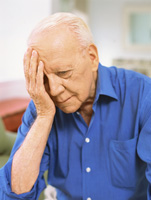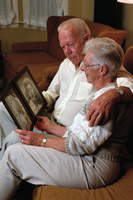Memory Problems

 Most people have some memory problems after a stroke. The severity of the problems depends on how much brain damage occurred. Persons with less severe strokes naturally recover their memory over weeks or months. For others, there are medical treatments and things you can do to help.
Most people have some memory problems after a stroke. The severity of the problems depends on how much brain damage occurred. Persons with less severe strokes naturally recover their memory over weeks or months. For others, there are medical treatments and things you can do to help.
Why Is It Important to Get Help?
Discuss your loved one’s memory problems with your healthcare team. They can do a physical exam and basic memory tests. Certain medicines and health problems can worsen memory loss. For some people, there are helpful treatments.
How Can You Find Help for Your Loved One?
Talk with a social worker or your healthcare team. Ask about a referral to a memory clinic or for other services. Below is a list of healthcare providers who can help:
- Neurologists or cognitive neurologists diagnose and treat memory problems.
- Neuropsychologists conduct tests and work with neurologists to treat problems.
- Occupational therapists and specialist memory nurses suggest practical tips. They provide care in the office or the patient’s home.
- Your local stroke associations can provide information. The Resources section at the end of this fact sheet has contact information for the American Stroke Association and the National Stroke Association.
What Do You Need to Know?
Strokes affect people in different ways. Many stroke survivors remember things more slowly. They often forget to do tasks like taking their medicines. Persons with strokes often have trouble with short-term memory or recalling things that just happened. Learning new names and telephone numbers is often hard. Most stroke survivors retain their long-term memory. For example, they remember events that occurred in the past.
What Are the Common Types of Memory Problems After Stroke?
The type of memory loss depends on the part of the brain that was damaged.
People whose stroke affected the right side of the body often have problems with verbal memory. Verbal memory includes remembering names, stories or information related to language or words.
Visual memory is often impaired in people whose stroke affected the left side of the body. Visual memory includes remembering faces, shapes or things you see.
How Can You Use Memory Aids to Help Your Loved One?
- Place an easy-to-read digital clock on a bedside table.
- Hang a big calendar on the wall.
- Post emergency and important phone numbers in large letters near the phone.
- Place a notepad in a handy place to jot down things to remember.
- Use a pill box to sort the pills that need to be taken each day.
How Can You Support Your Loved One?
- Make a memory book of favorite photos of people and places.
- Talk about the past. Share memories.
- Allow your loved one time to find the right words.
- Work at being understanding. It’s normal to get frustrated. Keep in mind this is not your loved one’s fault.
- Join a stroke support group. Other stroke caregivers can give you ideas for dealing with memory loss. Learn more about stroke support groups.
How Can You Help Your Loved One Stay Mentally Active?
The following activities may help improve memory:
- Crossword puzzles and word games
- Cards, dominoes and board games
- Computer games that are made to improve memory
Helpful Tips
- Help your loved one focus on one thing at a time. Avoid noise and lots of people.
- Keep information simple. Break down activities into small steps.
- Have a daily routine. Do tasks at the same time each day.
- Label drawers with pictures or words to describe their contents.
- Leave reminder notes around the house. For example, leave a note to turn off the stove or lock the door.
Remember
- Problems with memory are common after stroke. They affect each stroke survivor in different ways.
- There are things you can do to help your loved one. Examples include reminder notes and making a memory book.
- Support your loved one. Remember that memory problems are not your loved one’s fault.
More Resources 
Additional credible resources on this topic can be found here. Website pages may change or update, therefore if a link does not work, you may also try to type the information into your internet search bar. This Resource List will be updated frequently.
|
*Link Disclaimer: Links to information and Web sites outside of the Department of Veterans Affairs do not indicate an endorsement of products or services offered by the sites. In addition, these sites may have privacy and security policies that are inconsistent with those of VA. |
References: National Stroke Association. (2006). Stroke Facts-Recovery after Stroke: Thinking and Cognition. Retrieved April 7, 2009 from: http://www.stroke.org*; The Stroke Association. (October 2006). Cognitive Problems after Stroke. Retrieved December 9, 2008 from http://www.stroke.org.uk*; Healthwise, Inc. (2006). Stroke Rehabilitation: What to Expect After a Stroke. Retrieved April 14, 2009 from http://www.healthgrades.com*; American Stroke Association. (2009). Cognitive Challenges. Retrieved April 14, 2009 from http://www.strokeassociation.org*; American Stroke Association. (2009). Simple Techniques Can Help Memory. Retrieved June 2, 2009 from http://www.strokeassociation.org*; Chest, Heart & Stroke Scotland. (2006). Thinking and Behaviour Issues after Stroke. Retrieved 6/1/09 from http://www.chss.org.uk/publications/*.
These materials were created for the project:
Web-Based Informational Materials for Caregivers of Veterans Post-Stroke
Project Number SDP 06-327 funded by VA HSR&D Quality Enhancement Research Initiative (QUERI)



















